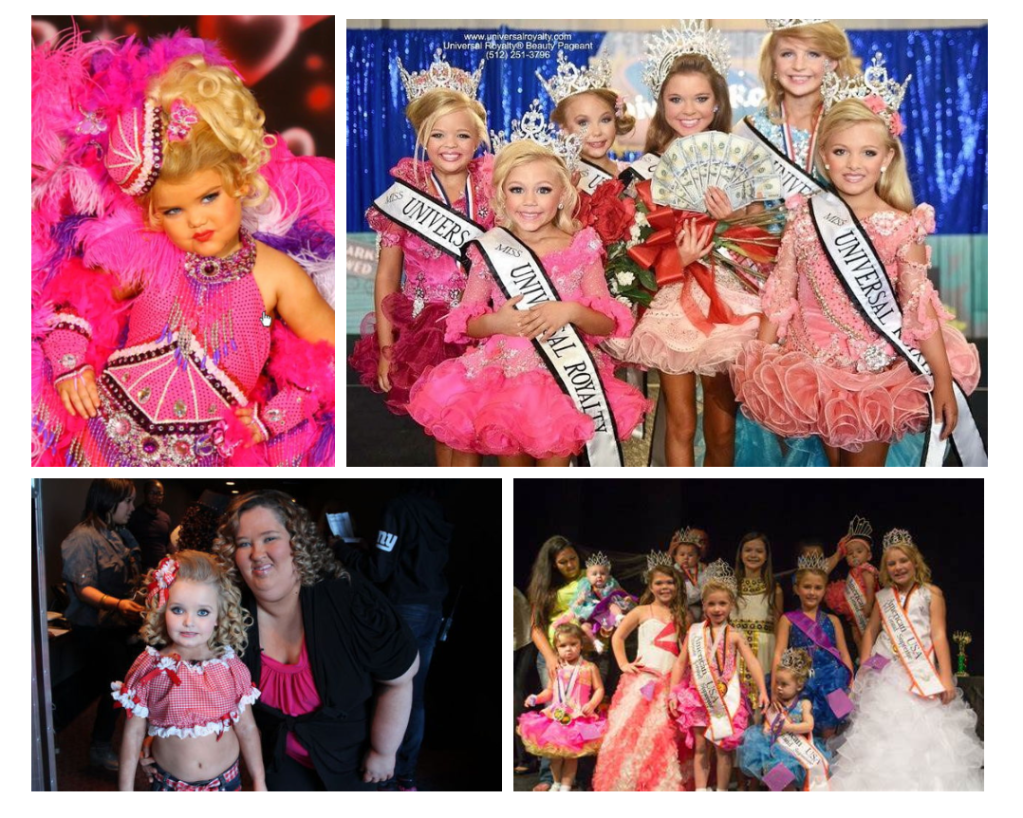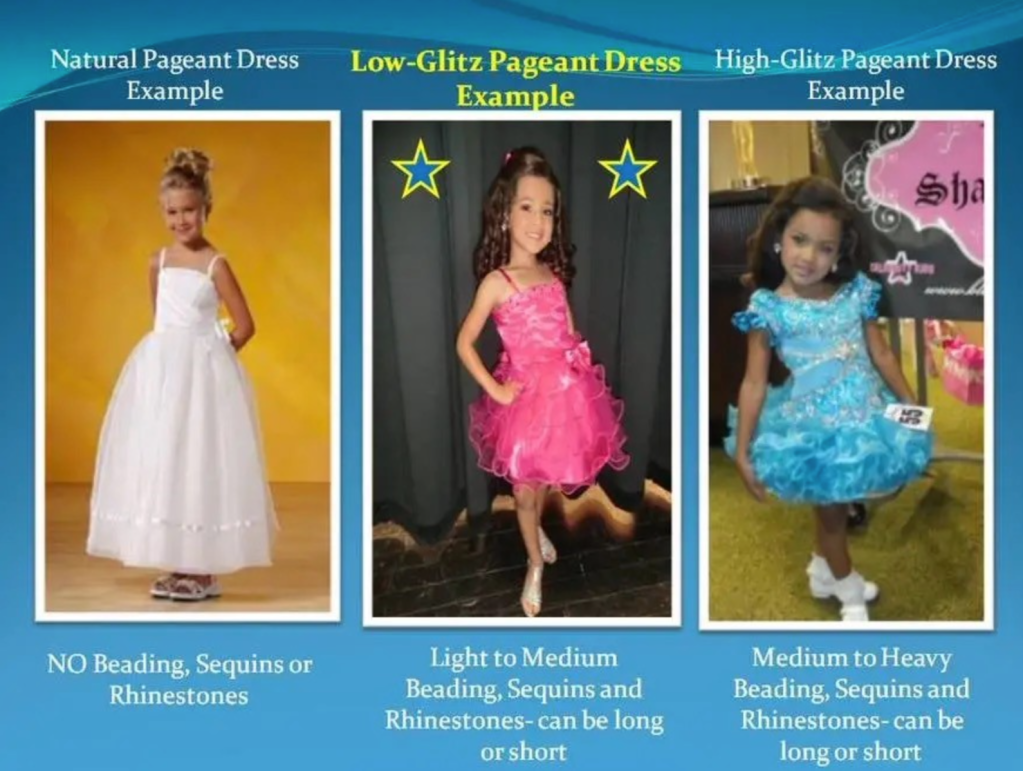Written by Madian Favretto, Francesca Villa & Chiara Forni
Hello everyone! Today we have a question for you. Have you ever heard about the phenomenon of baby beauty pageants? Does it sound unfamiliar to you? Let’s see if some pictures can refresh your memory.

Do you now recall it? But first, we want to ensure we are on the same page.
How can we define baby beauty pageants? They are events created to reward children for their appearance. Every pageant comprises a beauty and photographic contest, modelling, interviews and a talent competition. Winners usually receive cash as a prize.
We conducted an interview to understand what people from the northern part of Italy think about this phenomenon. We fear that children who participate in beauty pageants are not free to live their childhood normally, and they are forced to become adults sooner.
We will analyze this phenomenon’s bad and good consequences, mentioning general opinions and studies.
It is important to highlight the difference between glitz and natural pageants.
Glitz means attractive in a showy way. That’s why children who participate in these contests wear extravagant gowns, elaborate hairstyles with wigs, flawless make-up and use forced facial expressions. This style of modelling is in contrast with natural pageants.

This is what we discovered in our twenty-two interviews.
How old are you?
We did not find any substantial differences between the opinions of the various ages despite the wide age gap between the youngest (13 years old) and the oldest (83 years old).
How do you feel about the phenomenon of baby beauty pageants?
Common feelings among the interviewees after seeing the pictures above are loathing, anger, sadness and shock.
“I think it’s an evil thing to do to your children: you steal the opportunity to properly live their childhood. Kids no longer have time for fun, school, or different activities with peers or family because they are only concentrated on activities that have one aim: take part in beauty contests and win them.”
Do you perceive this phenomenon as something next to home or far away? Where exactly?
Lots of the respondents perceive baby beauty pageants as something far from home: they mainly named the USA as the place where this phenomenon occurs. Child beauty pageants are indeed a prosperous business in the USA, but no one seems to know that it is widespread outside the country.
Two interviewees mentioned that baby beauty pageants happen in west Europe, but only one mentioned Italy. Maybe in the north, people don’t see or hear often about this type of competition, but this doesn’t mean that it doesn’t exist in our country. As you can see from the video below, it is common to find these contests in the south of Italy.
Can you name some advantages if you think there are some?
Competitions can help people to believe in themselves more, increase their adaptability and handle pressure and stress. However, although these elements are positive in a typical context, they lose their benefit if required from such young children.
Most interviewees agreed on one notion: there are no advantages in most cases.
Only some of them identified money as an advantage. The possibility to not just win the competition but also to enrich themselves is appealing to the families.
People don’t know that it is not as easy as it seems. To participate, every child must pay a fee to enrol, but also: dresses, make-up, dance and voice lessons, and pageant coaches. These are just some expenses, never covered by the final price.
Do you think there are risks connected to this? If yes, name them.

For the experts, some risks could be:
- Superficial view on beauty
- Sexualization and unwanted attention from paedophiles
- Psychological and physical damages
- Pathological pursuit of perfection
- Excessive training
- Cosmetic surgery
- Eating disorders
- Low self-esteem
- Depression
Our interviewees added also:
- Unhealthy competition: “The children who participate in pageants might believe they are superior to their peers because of how they dress and behave on the stage”.
- Objectification of the children’s bodies: “Children doing these contests are not children anymore: they need to have fun, to play with other people, and not to be displayed as objects by their parents in these pageants”.
Do you think children can choose whether to participate in beauty contests? If not, who decides for them? Why?
Everyone agreed: children are not free to choose. Parents and especially mothers were identified as those who decide for their children. Many believe that children are pushed to accomplish what their mothers couldn’t achieve in their past.
Another reason could be the desire to become famous and/or rich.
The psychological pressure that pageant queens experience is not only families’ fault: in an environment like this, they start to believe that external beauty is the most important quality.
Would you have liked your parents to make you participate in some pageants?
We received negative feedback from most of the interviewees. For example, a 51-year-old woman pointed out that when she was a child, her parents didn’t know about the existence of these contests because of the absence of the internet/media.
Would you like, as a (future) parent, your children to participate in this kind of contest?
Most of them answered negatively, with one exception: they wouldn’t deny their children the possibility to participate in natural modelling contests if they wanted it.
To conclude, we agree that children participating in beauty pageants cannot live their childhood normally since they are treated like small women/men. This will lead to many negative consequences in their future life.
Sources:
CreditCards.com. (2011, July 21). Toddlers, tiaras — and debt: the costs of child beauty pageants. Nasdaq. Retrieved April 23, 2023, from https://www.nasdaq.com/articles/toddlers-tiaras-and-debt-costs-child-beauty-pageants-2011-07-21
Subero, O. (2019, October 15). Behind the scenes: Inside the world of child beauty pageants – inspirational muse. Inspirational Muse. Retrieved April 24, 2023, from http://insprational-muse.com/blog-post/
Cumberland, S. (2016, May 31). The effects of child beauty pageants on kids. School Is Easy Tutoring. Retrieved April 24, 2023, from https://www.schooliseasy.com/tutor/tutor-blog/effects-child-beauty-pageants-kids/
Raschke, L. (2020, October 13). Column: Child pageants are exploitative. The Daily Eastern News. Retrieved April 24, 2023, from https://www.dailyeasternnews.com/2020/10/13/column-child-pageants-are-exploitative/
Cursi, V. (2019, December 10). Baby Miss, boom di concorsi per bambini. L’altolà del Garante: no allo sfruttamento. Il Messaggero. Retrieved April 24, 2023, from https://www.ilmessaggero.it/italia/concorsi_bellezza_bambini_italia_garante_ultime_notizie_oggi_9_dicembre_2019-4913665.html
Bruno, D., & Regoli, G. (2022, September 4). I child beauty pageants nell’industria della bellezza statunitense. Università Di Bologna. Retrieved April 24, 2023, from https://site.unibo.it/canadausa/it/articoli/i-child-beauty-pageants-nell-industria-della-bellezza-statunitense